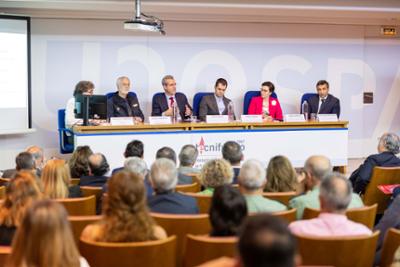

New risks in fire prevention
Isabel Marcos, coordinator of the Technical Regulations Area (Ministry of Housing-MITMA), pointed out at a round table organised by TECNIFUEGO that the Technical Building Code (CTE) needs to be updated once again. As she explained, there are new risks that will require amendments, including those of photovoltaic installations. In addition, developments in fire prevention and digitalisation are opening up a different scenario that also needs to be addressed in the regulations.
On the occasion of its recently held general assembly, TECNIFUEGO organised a round table discussion on "Current challenges in fire protection", coordinated by Francisco Herranz, technical manager of this association, which reviewed the situation of fire protection the challenges it faces in terms of prevention, installation, intervention, qualification and legislation.
The various speakers provided some key ideas for understanding the current state of fire safety. Among them, Rafael Ferrándiz, head of the Madrid City Council Fire Department, pointed out that it is essential for people to know what to do in the event of a fire and how to react. Citizen training is extremely important: "I believe that the most important thing is to raise awareness among citizens, which is why we have carried out campaigns such as the current one, in which a mobile classroom that travels around the different districts of the city shows how a fire develops and what to do when it does. For example, calling 1-1-2, installing a detector, and basic behaviour when a fire has broken out in a building: staying indoors and closing the door if there is smoke in the stairwell and waiting for the fire brigade to arrive, etc.".
Useful preventive information
Jorge Iñesta, deputy director general of Industry and Inspection (Regional Government of Madrid), spoke in depth on this point, and on the informative work that the Regional Government is doing for municipalities, updating information on legislation so that it is useful and preventive. In this regard, he said that there is a problem of awareness: "part of society sees fire safety regulations and controls and requirements as a mere administrative burden... People must realise that maintaining an installation in good condition guarantees their own safety".
Jorge Jimeno, Head of Area (Ministry of Industry-MINCOTUR), also referred to the informative and preventive poster campaign for fire protection equipment launched by the Ministry, with the collaboration of TECNIFUEGO, among other associations, with the aim of familiarising the end user with this equipment and its necessary maintenance. He also reported on the updating of the RSCIEI (Fire Safety Regulations for Industrial Establishments) and some aspects of the RIPCI (Fire Protection Installations Regulations). "Nearly 1,000 claims have been received, of which, after eliminating the repeated ones, there are now 600". He added that the TRIS procedure for the prevention of technical barriers to trade in the revision of this regulation has been published on the European Commission's website. Finally, he reported that it is foreseeable that this legislation "which will undoubtedly improve fire protection" will come into force in 2024.
Isabel Marcos, coordinator of the Technical Regulations Area (Ministry of Housing-MITMA), pointed out that the Technical Building Code, CTE, is a 2006 regulation "which, although it has had its successive revisions, needs to be updated. There are new risks in building that are going to require amendments, risks in photovoltaic installations... In addition, the updating of the RSCIEI will allow us to update some aspects of the Basic Fire Safety Document (DB SI) of the Technical Code". On the other hand, the evolution and development of fire protection installations, and the awareness of citizens and the new uses provided by digitalisation "are placing us in a new scenario that must also be addressed in the regulations".
People's safety
Adrián Gómez, president of TECNIFUEGO, then closed the panel discussion, and thanked UNESPA (the insurance employers' association) and its chairperson "for hosting the event here at its headquarters", and the speakers for sharing their knowledge and interesting specialist points of view. "We believe that these initiatives are very useful for everyone, as they pursue a common goal: zero casualties through excellence in fire protection," he said.





